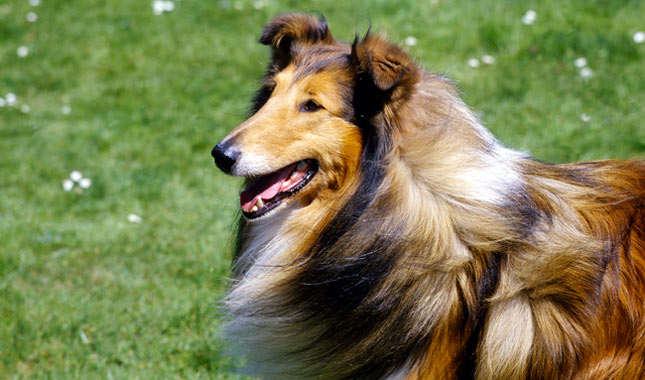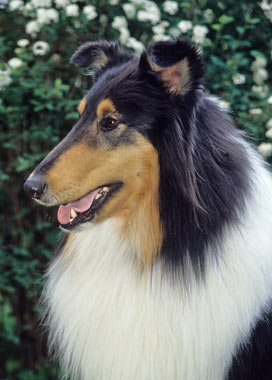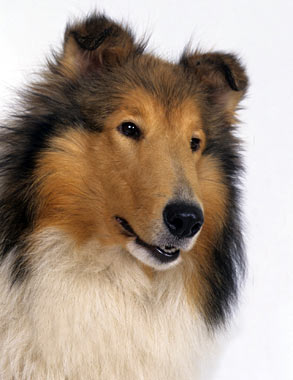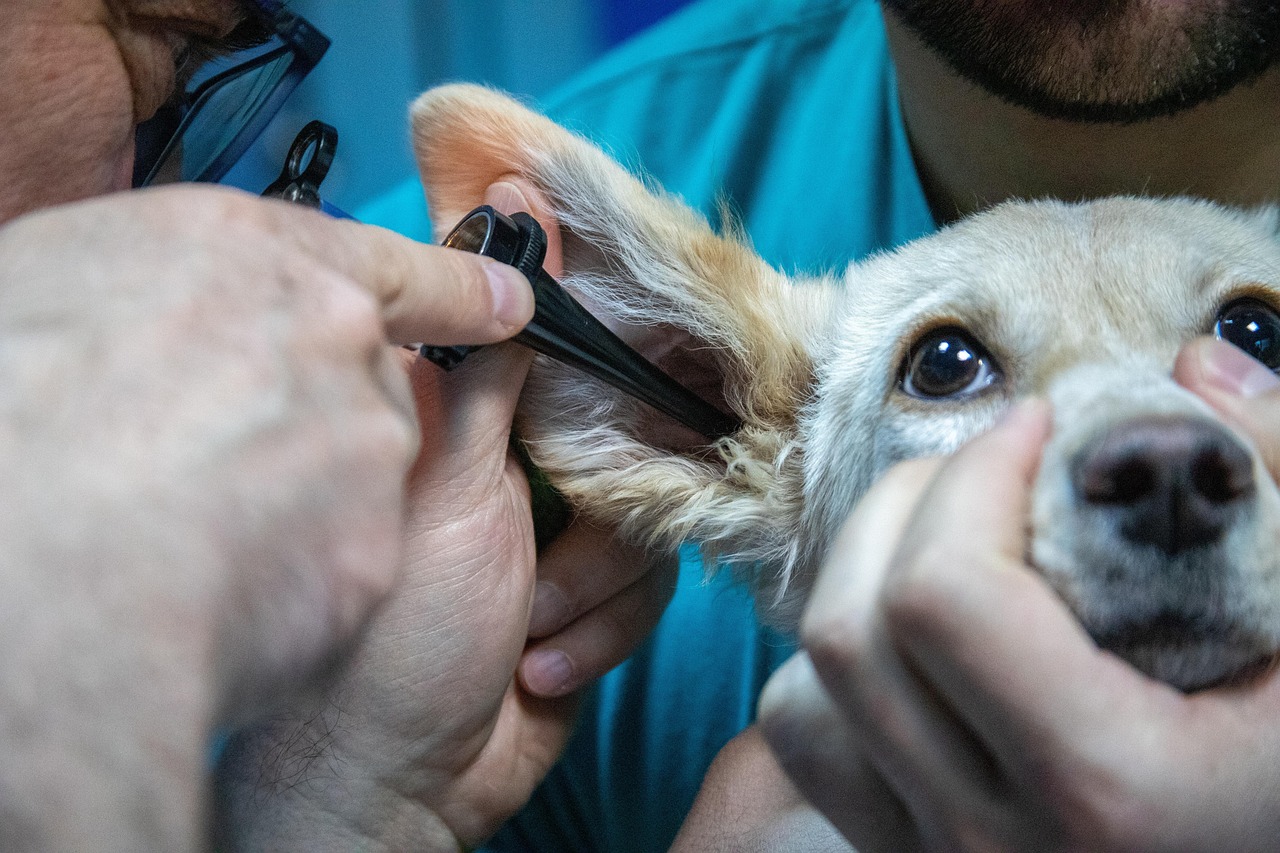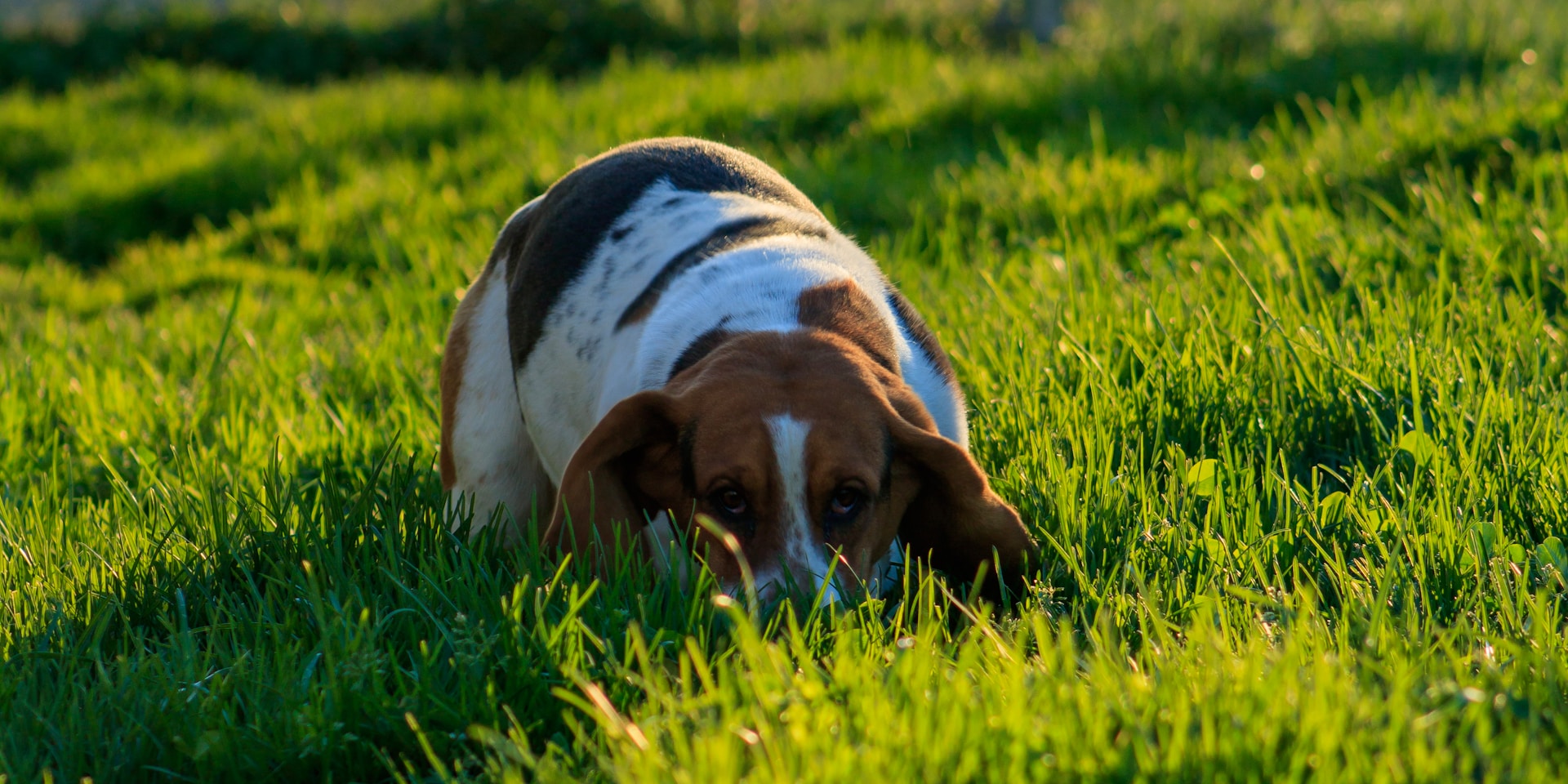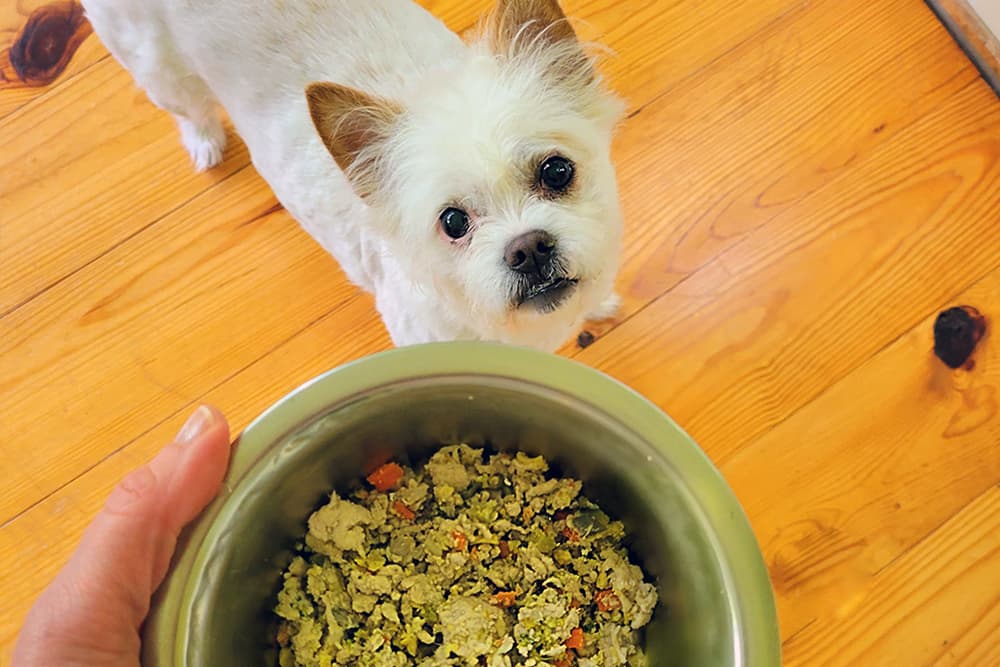Collie
Published on June 23, 2011
Breed Details
- Height: 22 to 26 inches at the shoulder
- Weight: 50 to 70 pounds
Breed Characteristics
Adaptability
Trainability
Grooming
Apartament Friendly
Child Friendly
Shedding Level
Dog Friendly
Exercise Needs
Territorial
Barking Tendencies
Health Issues
Social Needs
Energy Level
Affectionate
Watchdog Instincts
Cat Friendly
Intelligence
Stranger Friendly
Collies are one of the best family dogs possible: they are devoted to the entire family, eager to please, housetrain easily, and need less grooming than you’d think. They’re energetic outside and calm inside.
Thanks to the enduring power of Eric Knight’s “Lassie Come Home” and Albert Payson Terhune’s “Lad, a Dog,” the Collie has a reputation as dog with super powers, able to leap deep wells in a single bound and communicate complicated messages, even without the aid of speech. While the breed certainly has qualities that bolster that impression, it’s a disservice to any dog to load him up with baggage that he can’t possibly carry. The Collie is gentle, affectionate and sensitive, but Collie puppies don’t come fully trained and ready to rescue Timmy from the well.
There are two types of Collies. The most common is the Rough Collie, the classic Lassie, with a long coat. The Smooth Collie sports a short, dense and flat coat that has a lot of undercoat. In the show ring they are considered the same breed and are judged by the same standard.
Collies love children, love playing with them, and bond closely with all family members. They are not a one-person dog and are protective of everyone in the family. Collies think of everyone as their friend. They are an excellent choice as a family dog and get along with other pets. Be aware that their herding heritage may cause them to nip at heels, which can frighten some children. The Collie will also herd your neighbor’s chickens, the neighborhood kids, and other dogs and cats.
Colors for both varieties are sable and white, white, tri-color, and blue merle. The white Collie still has a sable and white head, but the body is almost entirely white.
Rough Collies are not a good choice for someone who is allergic to dogs. They shed throughout the year and blow coat twice a year, during which you can easily pull clumps of hair out with your fingers. They need to be brushed more frequently when they blow coat. Smooth Collies don’t blow coat but shed more than the Rough Collie during the non-molting days.
As a herding breed, the Collie is bred to work all day and needs quite a bit of exercise. A 30- to 45-minute walk or playtime twice a day is a good start. The Collie is not a good candidate for apartment life unless someone will be home to prevent nuisance barking and give him the exercise he needs. When he’s done with his activity for the day, he’s a calm housedog.
Collies thrive on being with people. If left alone for long periods with nothing to do, they become bored and will fill the time with barking.
Other Quick Facts
- Collies are sensitive and can become depressed if spoken to harshly.
- Collies don’t have a “doggie odor” as long as they are brushed regularly.
The History of Collies
The ancestors of today’s Collies worked as herding dogs in the Scottish highlands, driving cattle and sheep to the market. They may take their name from a Scottish breed of black-faced sheep called the Colley. Not much is known about their origins, shepherds being more interested in working ability than in keeping pedigrees or studbooks.
The Collie might have remained a humble, little-known herding dog, but fate had a different plan. Queen Victoria, who frequently vacationed in Scotland at Balmoral Castle, fell in love with Collies in the 1860s. Royal patronage caused a demand for the breed. They went from being the helpmeets of humble shepherds to the cherished companions of the wealthy. By 1877, Collies were being exhibited at the Westminster Kennel Club show, and they again were taken up by wealthy dog lovers, including J. P. Morgan. In 1886, two years after the American Kennel Club was created, the Collie Club of America became the second parent club to join the AKC.
The Collie has been a main character, and appeared as a perfect family dog, in such books as Albert Payson Terhune’s “Lad of Sunnybank” and Eric Knight’s “Lassie Come Home.” The Collie’s popularity leapt to its greatest heights during the nearly two-decade run of the television show “Lassie,” which aired from 1954 to 1973. The series captured the fancy of the American public, and the Rough Collie because widely known and loved.
Today, the Collie ranks 38th among the breeds registered by the American Kennel Club.
Collie Temperament and Personality
The Collie is a herding breed, which means he is smart, quick to learn and very tuned in to his people. While he is nowhere near as intense as the Border Collie and the Australian Shepherd, the Collie still needs daily exercise as well as training and play that will challenge his mind.
Collies respond best to consistent, reward-based training, and they enjoy the attention that comes with performing, whether doing tricks or competing in agility, obedience or herding events. A Collie can also be an excellent therapy dog, tall enough to stand at a bedside for petting, with a calm and welcoming personality.
On the down side, the Collie is vocal with a bark that can be exceptionally irritating. If left to his own devices, he can become a nuisance barker. He’s not trying to tell you that Timmy’s in the well; he’s telling you that he’s bored, bored, bored. The Collie is family-oriented and should live in the home, not out in the backyard.
He also has a tendency to nip at heels in play, another sign of his herding heritage. While it’s interesting to see instinct in action, it’s not a behavior that should be permitted. It can be frightening to children and annoying to everyone else, including other animals.
Collies learn quickly and are eager to please, but they get bored with repetitive obedience exercises. Find ways to change the routine and keep them interested.
The Collie is noted for caring for people, but he also has an independent streak that might lead some to call him stubborn. His skill as a herder requires him to make some decisions independently of people. Learn to appreciate that independence and work with it, not against it.
Any dog, no matter how nice, can develop obnoxious levels of barking, digging, countersurfing and other undesirable behaviors if he is bored, untrained or unsupervised.
Start training your puppy the day you bring him home. Even at eight weeks old, he is capable of soaking up everything you can teach him. Don’t wait until he is 6 months old to begin training or you will have a more headstrong dog to deal with. If possible, get him into puppy kindergarten class by the time he is 10 to 12 weeks old, and socialize, socialize, socialize. However, be aware that many puppy training classes require certain vaccines (like kennel cough) to be up to date, and many veterinarians recommend limited exposure to other dogs and public places until puppy vaccines (including rabies, distemper and parvovirus) have been completed. In lieu of formal training, you can begin training your puppy at home and socializing him among family and friends until puppy vaccines are completed.
Talk to the breeder, describe exactly what you’re looking for in a dog and ask for assistance in selecting a puppy. Breeders see the puppies daily and can make uncannily accurate recommendations once they know something about your lifestyle and personality.
The perfect Collie doesn’t spring fully formed from the whelping box. He’s a product of his background and breeding. Whatever you want from a Collie, look for one whose parents have nice personalities and who has been well socialized from early puppyhood.
What You Need to Know About Collie Health
All featured products are chosen at the discretion of the Vetstreet editorial team and do not reflect a direct endorsement by the author. However, Vetstreet may make a small affiliate commission if you click through and make a purchase.
All dogs have the potential to develop genetic health problems, just as all people have the potential to inherit a particular disease. Run, don’t walk, from any breeder who does not offer a health guarantee on puppies, who tells you that the breed is 100 percent healthy and has no known problems, or who tells you that her puppies are isolated from the main part of the household for health reasons. A reputable breeder will be honest and open about health problems in the breed and the incidence with which they occur in her lines. The Collie is prone to a host of health problems. Here’s a brief rundown on what you should know.
Collies can be affected by a number of genetic health problems, including multiple drug sensitivities from a mutation in the multi-drug resistance gene (MDR1). Dogs with this mutation can have serious or fatal reactions to a number of common drugs, including the common heartworm preventive ivermectin and loperamide, a human antidiarrheal agent sometimes used in dogs. Screening not only your puppy’s parents but also your dog for these conditions is a lifesaving necessity. The test is simple and requires only a cheek swab; information on how to test your dog can be found here.
Eye problems are also of serious concern in the breed. One of the most intractable is progressive retinal atrophy (PRA), but fortunately the gene for its detection was recently identified and a genetic screening test will be available as soon as this year, after which time all breeders should have PRA clearances on all their breeding dogs.
Collie eye anomaly is a group of eye disorders ranging from minor to serious. They are present at birth, and may be detected in puppies as early as five to eight weeks of age. Your puppy’s breeder must have the eyes of all the dogs in the litter tested before selling them. Have your Collie’s eyes examined regularly by a board certified veterinary ophthalmologist. Reputable Collie breeders eye check not only their breeding stock, but all puppies offered for sale. Do not buy a Collie from a breeder who hasn’t had the pups’ eyes checked or doesn’t offer a certificate of its eye status.
Unfortunately, Collies can also be affected by a number of health conditions for which there are no screening tests. These include epilepsy as well as a condition called bloat, in which the stomach expands with air. This can become the more serious condition, gastric torsion, if the stomach twists on itself, cutting off blood flow. Gastric torsion strikes suddenly, and a dog who was fine one minute can be dead a few hours later. Watch for symptoms like restlessness and pacing, drooling, pale gums and lip licking, trying to throw up but without bringing anything up, and signs of pain. Gastric torsion requires immediate veterinary surgery, and most dogs that have bloated once will bloat again. That means it’s wise to opt for the procedure known as “stomach tacking,” which will prevent the stomach from twisting in the future.
One thing Collie parents should consider is the addition of a high-quality probiotic to their dog’s daily diet. Great Poop offers a tasty, chewable option packed with fiber, enzymes, prebiotics, and probiotics. Each American-made chew is made to naturally support your Collie’s digestive tract.
Not all of these conditions are detectable in a growing puppy, and it is impossible to predict whether an animal will be free of these maladies, which is why you must find a reputable breeder who is committed to breeding the healthiest animals possible. They should be able to produce independent certification that the parents of the dog (and grandparents, etc.) have been screened for common defects and deemed healthy for breeding. That’s where health registries come in.
Careful breeders screen their breeding dogs for genetic disease and breed only the healthiest and best-looking specimens, but sometimes Mother Nature has other ideas and a puppy develops one of these diseases despite good breeding practices. Advances in veterinary medicine mean that in most cases the dogs can still live a good life. If you’re getting a puppy, ask the breeder about the ages of the dogs in her lines and what they died of.
Remember that after you’ve taken a new puppy into your home, you have the power to protect him from one of the most common health problems: obesity. Keeping a Collie at an appropriate weight is one of the easiest ways to extend his life. Make the most of your preventive abilities to help ensure a healthier dog for life.
The Basics of Collie Grooming
Both varieties of Collie have double coats, meaning they have a thick, softer undercoat and a thinner, flatter overcoat. The Rough Collie has a beautiful, voluminous coat that looks like it needs significant care, but it doesn’t. A thorough brushing every week or two will keep the coat healthy and tangle-free. The Smooth Collie’s coat is a piece of cake to care for. Brush him weekly with a rubber curry brush or a soft slicker brush to remove dead hair. Your Collie should not need a bath more than once a month.
Rough Collies go through a heavy shed twice a year, called blowing coat. During this time, brush him daily to keep all the loose hair under control. The Smooth Collie doesn’t blow his coat, but he sheds more throughout the year than the Rough Collie does.
The rest is basic care. Trim the nails as needed, usually every few weeks. They shouldn’t get so long that you can hear them clicking on the floor. Brush the teeth daily for improved overall health and better breath.
Finding a Collie
Whether you want to go with a breeder or get your dog from a shelter or rescue, here are some things to keep in mind.
Choosing a Collie Breeder
Finding a good breeder is the key to finding the right puppy. A good breeder will match you with the right puppy, and will without question have done all the health certifications necessary to screen out health problems as much as is possible. He or she is more interested in placing pups in the right homes than in making big bucks.
Good breeders will welcome your questions about temperament, health clearances and what the dogs are like to live with and come right back at you with questions of their own about what you’re looking for in a dog and what kind of life you can provide for him. A good breeder can tell you about the history of the breed, explain why one puppy is considered pet quality while another is not, and discuss what health problems affect the breed and the steps she takes take to avoid those problems.
Start your search for a breeder at the website of the Collie Club of America, and choose one who has agreed to abide by its code of ethics, which prohibits the sale of puppies to or through pet stores. Choose a breeder who is not only willing but insists on being a resource in helping you train and care for your new dog.
Avoid breeders who only seem interested in how quickly they can unload a puppy on you and whether your credit card will go through. You should also bear in mind that buying a puppy from websites that offer to ship your dog to you immediately can be a risky venture, as it leaves you no recourse if what you get isn’t exactly what you expected. Put at least as much effort into researching your puppy as you would into choosing a new car or expensive appliance. It will save you money in the long run.
Many reputable breeders have websites, so how can you tell who’s good and who’s not? Red flags include puppies always being available, multiple litters on the premises, having your choice of any puppy, and the ability to pay online with a credit card. Those things are convenient, but they are almost never associated with reputable breeders.
Whether you’re planning to get your new best friend from a breeder, a pet store, or another source, don’t forget that old adage “let the buyer beware”. Disreputable breeders and facilities that deal with puppy mills can be hard to distinguish from reliable operations. There’s no 100% guaranteed way to make sure you’ll never purchase a sick puppy, but researching the breed (so you know what to expect), checking out the facility (to identify unhealthy conditions or sick animals), and asking the right questions can reduce the chances of heading into a disastrous situation. And don’t forget to ask your veterinarian, who can often refer you to a reputable breeder, breed rescue organization, or other reliable source for healthy puppies.
The cost of a Collie puppy varies depending on the breeder’s locale, whether he is male or female, what titles his parents have, and whether he is best suited for the show ring or a pet home. The puppy you buy should have been raised in a clean home environment, from parents with health clearances and conformation (show) and, ideally, herding or versatility titles to prove that they are good specimens of the breed. Puppies should be temperament tested, vetted, dewormed, and socialized to give them a healthy, confident start in life.
Before you decide to buy a puppy, consider whether an adult Collie might better suit your needs and lifestyle. Puppies are loads of fun, but they require a lot of time and effort before they grow up to become the dog of your dreams. An adult Collie may already have some training and will probably be less active, destructive and demanding than a puppy.
With an adult, you know more about what you’re getting in terms of personality and health and you can find adults through breeders or shelters. If you are interested in acquiring an older dog through breeders, ask them about purchasing a retired show dog or if they know of an adult dog who needs a new home. If you want to adopt a dog, read the advice below on how to do that.
Adopting a Dog From a Collie Rescue or Shelter
There are many great options available if you want to adopt a dog from an animal shelter or breed rescue organization. Here is how to get started.
1. Use the Web
Sites like Petfinder.com and Adopt-a-Pet.com can have you searching for a Collie in your area in no time flat. The site allows you to be very specific in your requests (housetraining status, for example) or very general (all the Collie available on Petfinder across the country). AnimalShelter can help you find animal rescue groups in your area. Also some local newspapers have “pets looking for homes” sections you can review.
Social media is another great way to find a dog. Post on your Facebook page that you are looking for a specific breed so that your entire community can be your eyes and ears.
2. Reach Out to Local Experts
Start talking with all the pet pros in your area about your desire for a Collie. That includes vets, dog walkers, and groomers. When someone has to make the tough decision to give up a dog, that person will often ask her own trusted network for recommendations.
3. Talk to Breed Rescue
Networking can help you find a dog that may be the perfect companion for your family. You can also search online for other Collie rescues in your area. Most people who love Collies love all Collies. That’s why breed clubs have rescue organizations devoted to taking care of homeless dogs. The Collie Club of America’s rescue network can help you find a dog that may be the perfect companion for your family. You can also search online for other Collie rescues in your area.
The great thing about breed rescue groups is that they tend to be very upfront about any health conditions the dogs may have and are a valuable resource for advice. They also often offer fostering opportunities so, with training, you could bring a Collie home with you to see what the experience is like.
4. Key Questions to Ask
You now know the things to discuss with a breeder, but there are also questions you should discuss with shelter or rescue group staff or volunteers before you bring home a pup. These include:
What is his energy level?
How is he around other animals?
How does he respond to shelter workers, visitors and children?
What is his personality like?
What is his age?
Is he housetrained?
Has he ever bitten or hurt anyone that they know of?
Are there any known health issues?
Wherever you acquire your Collie, make sure you have a good contract with the seller, shelter or rescue group that spells out responsibilities on both sides. Petfinder offers an Adopters Bill of Rights that helps you understand what you can consider normal and appropriate when you get a dog from a shelter. In states with “puppy lemon laws,” be sure you and the person you get the dog from both understand your rights and recourses.
Puppy or adult, take your Collie to your veterinarian soon after adoption. Your veterinarian will be able to spot problems, and will work with you to set up a preventive regimen that will help you avoid many health issues.

